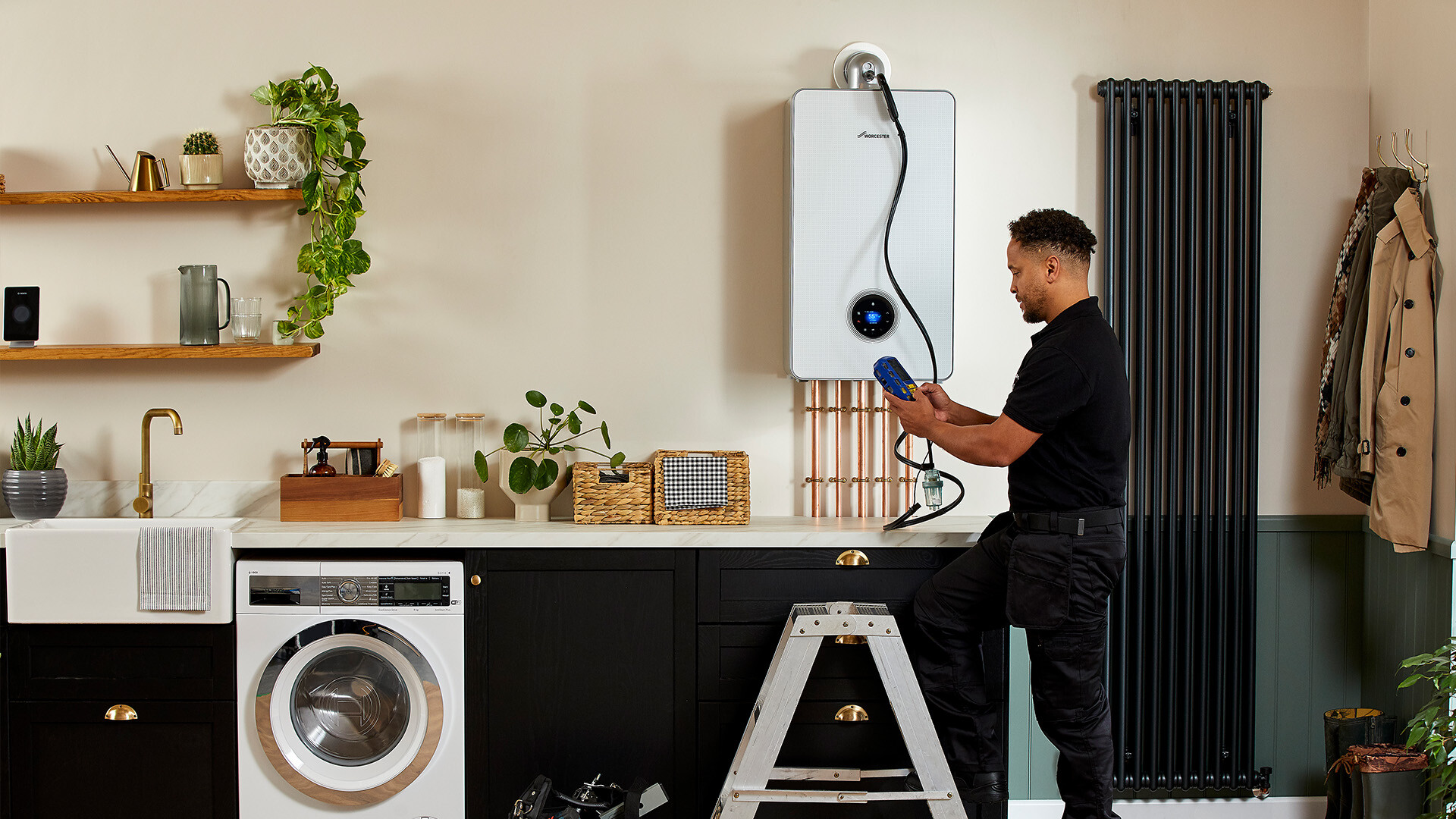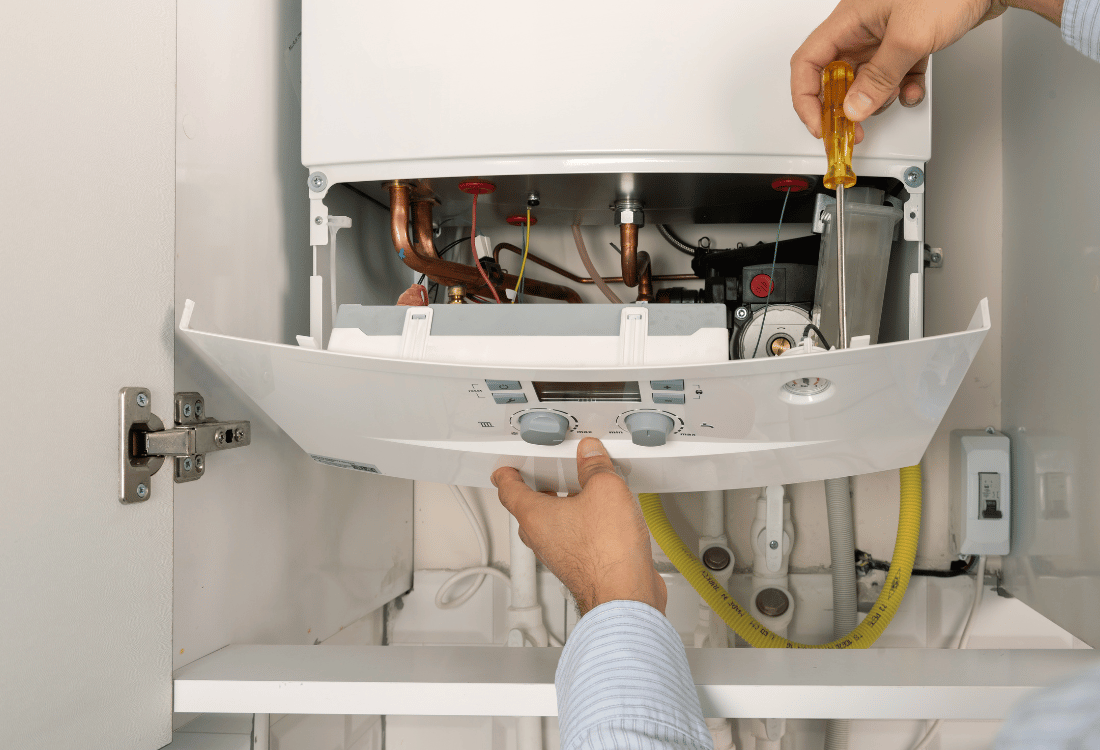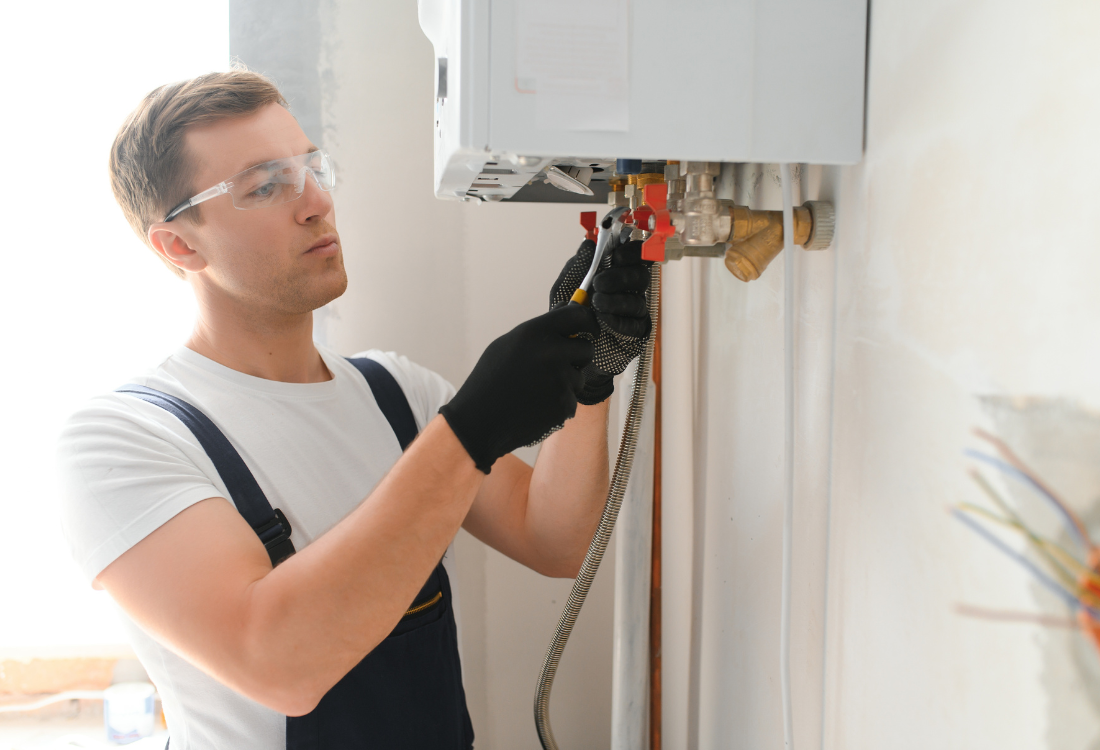If your Ideal Logic Boiler is showing an error code, don’t panic. Ideal Logic boilers are one of the most robust and reliable solutions on the market. Fault codes are rare, and they usually mean that something simple has gone awry.
You can use our quick guide to see if your problem is a DIY fix, or if you need to book a service with a registered heating engineer.
F-Fault Codes
FD: no water flow
What does FD fault code mean?
The FD fault code on an Ideal Logic boiler means that there is no water flow. When this fault appears, your boiler will not work. There are three main causes: airlocks, faulty pumps, or wiring issues. Less commonly, your boiler may simply be low on water.
Can I fix an FD fault code myself?
Often, yes. Try repressurising your boiler and see if that works. You can also bleed your radiators to remove any trapped air. However, if these don’t work, you will need a qualified heating engineer to diagnose and fix the issue.
F1: Low Water Pressure
What does F1 fault code mean?
The F1 fault code is one of the most common. It tells you that the pressure in your boiler is too low. Your boiler may still be operating, but it will be much less efficient. There are a hundred different reasons why boilers lose pressure, ranging from simple factors such as cold weather to more serious problems such as leaks.
Can I fix an F1 error code myself?
Often, yes. Simply repressurise your boiler to 1.5 bar. However, if this problem keeps occurring, the next step is to start looking for leaks. If you can’t identify the source of repeated boiler pressure loss, always call an expert.
F2: Flame Loss
What does an F2 error code mean?
Flame loss is usually a gas supply issue. It is likely that your pilot light will be extinguished, and your boiler will not be working.
Can I fix an F2 error code myself?
No. However, the problem may be that the gas supply in your area is interrupted, so check with your neighbours! If not, or if the problem keeps appearing, it is likely that you have a faulty gas valve. You will need a qualified heating engineer to replace this safely, as there is a major risk of carbon monoxide leakage if it is not done correctly.
F3: Fan Fault
What does an F3 error code mean?
An F3 error code refers to a malfunctioning fan. The fan is a safety feature that removes hot gasses. If the fan stops working, the boiler will automatically lock itself. The most typical cause is simply that the fan needs cleaning, although damaged blades can also be an issue.
Can I fix an F3 error code myself?
It is not a good idea to try to clean or fix a boiler fan by yourself. If you do, you risk damaging the sensitive and critical machinery around it, and this can result in irreparable boiler damage. Calling a gas safe engineer is always a better option for an F3 error code.
F4, F5, F6: Thermistors And Sensors
What do F4, F5, and F6 error codes mean?
Thankfully, these faults are very rare on Logic Boilers. However, they all relate to the thermistor and other safety sensors. Thermistors prevent your boiler from overheating, so are crucial.
Can I fix an F4, F5, or F6 error code by myself?
No. These codes require professional attention. However, don’t panic. The root cause is often a faulty sensor, so it doesn’t necessarily mean a catastrophic problem. Regular servicing and maintenance can significantly reduce the risk of encountering an F4, F5, or F6 fault code.
L-Fault Codes
L1: Flow temperature overheat or no water flow
What is an L1 overheating or flow issue?
Overheating is when the water temperature is unsafe. There are four main causes. The first is that there is a leak in the cooling system. The second is that corrosion has caused the pipes to become blocked. Thirdly, your pump may be malfunctioning. An L1 code can also be because you have accidentally set your flow temperature too high.
Can I fix an L1 fault code myself?
Often, yes. Try adjusting your flow temperature so that it is between 60oC and 70oC. If this doesn’t work, you will need a professional. If the problem keeps happening, the easiest solution is usually a system flush, which will blast away the debris that are blocking your pipes. Regular maintenance and servicing can significantly reduce the likelihood of an L1 fault code.
L2: Ignition Lockout
What is an L2 ignition lockout boiler fault?
Ignition lockouts are when your boiler fails to ignite. This may be because the gas supply is not working, the pressure is too low, or the ignition leads have become damaged. Alternatively, the pilot light may have a problem.
Can I fix an L2 fault code myself?
Sometimes. Firstly, check your gas supply and make sure it is turned on. If the pilot light is extinguished, try relighting it. If this doesn’t work, you will need a Gas Safe engineer to take a closer look and diagnose the root cause.
L5: Frequent Resetting
What is an L5 fault code?
An L5 fault code occurs when your boiler keeps resetting itself. This is a safety feature that is designed to stop your boiler from dangerous overheating. The L5 instruction is given by the temperature control valve (TCV). As such, it could be an issue with the valve, or the sensor may be detecting a problem elsewhere in the system.
Can I fix an L5 fault code myself?
It’s unlikely. Water temperature problems are usually caused by the build-up of sludge and debris, which requires a simple yet effective professional system flush. It may also be a problem with the pump or the heat exchanger, both of which require a qualified heating engineer to fix.
L6 False Flame Lockout
What is an L6 fault code?
An L6 error code occurs when a false flame has been detected. This means that the gas valve is off, but your boiler is identifying a lit flame. Obviously, this issue can cause a lot of panic. However, it is more likely that it is a communication problem than a pending explosion.
Can I fix an L6 fault code myself?
Sometimes. Just like a computer, your boiler might just need switching off and on again to reboot the electrical system. If this doesn’t work, you will need a Gas Safe engineer to investigate the sensors.
What next?
At Trusted Boilers, our Gas Safe qualified heating engineers are here to keep your boiler running. Our first goal is to help you avoid the problem of error codes altogether with regular servicing. However, if you are unlucky enough to have a boiler fault code, get in touch.
Image Source: CanvaSubscribe to our blog
You May Also Like
These Related Stories

Understanding The Difference Between Plumber And Heating Engineer

Winter Is Coming: 5 Key Maintenance Tips To Prepare Boiler For Winter



